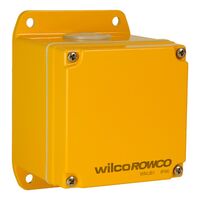Kingsgrove Branch:
Metal Junction Box

G'day! For most wiring jobs inside the walls of an Aussie home, a standard plastic junction box does the trick just fine. It keeps the connections neat, tidy, and protected. But what happens when you're on a rough-and-tumble worksite, in a factory full of heavy machinery, or dealing with wiring that needs serious, heavy-duty protection?
In those situations, a flimsy plastic box is asking for trouble. You need something built like a brick dunny, something that can handle some serious hard yakka. You need a metal junction box.
What's the Go with a Metal Junction Box?
A metal junction box, often called a steel J-box or enclosure, is a heavy-duty container designed to house and protect electrical connections in more demanding environments. As the name suggests, it's typically made from robust galvanised steel or, for ultimate corrosion resistance, stainless steel.
Like any junction box, its main job is to provide a safe, secure space for joining wires, but its tough metal construction offers a whole extra level of protection compared to standard plastic.
Why Choose Metal? The Ripper Advantages
Opting for a metal junction box over a plastic one gives you some fair dinkum significant benefits, especially in commercial or industrial settings.
- Superior Strength and Impact Resistance: This is the big one. Metal boxes can take a beating. They're far less likely to crack or shatter if accidentally hit by tools, machinery, or falling objects on a busy worksite.
- Better Fire Resistance: Steel has a much higher melting point than plastic and doesn't contribute fuel to a fire. In certain commercial or industrial applications, using metal enclosures is a specific requirement for fire safety compliance.
- Excellent EMI/RFI Shielding: The metal enclosure acts like a shield (a Faraday cage), protecting sensitive electronic connections inside from electromagnetic interference (EMI) or radio frequency interference (RFI), which can be common in industrial environments with lots of machinery.
- Durability in Harsh Environments: Steel stands up better to certain chemicals, solvents, and extreme temperature fluctuations that might degrade plastic over time.
Where You'll Find These Tough Nuts
You won't typically see metal junction boxes used for standard light switches in a suburban home. They are the go-to choice for more demanding applications:
- Industrial Settings: Factories, processing plants, warehouses, workshops.
- Commercial Buildings: Plant rooms, data centres, high-traffic areas.
- Worksites: Anywhere requiring temporary but robust power distribution.
- Hazardous Areas: Specific types are designed for environments with flammable gases or dust (requiring specialised certification).
- Where High Impact Resistance is Needed: Such as in public access areas or near heavy machinery.
Don't Forget the IP Rating and Material
- IP Rating: If the box is going outdoors or in a wet/dusty area, it must still have an appropriate IP (Ingress Protection) rating (e.g., IP56, IP66) to ensure it's properly sealed.
- Galvanised vs. Stainless: Galvanised steel offers good protection for most uses. For highly corrosive environments or coastal areas, stainless steel is the premium choice for ultimate longevity.
Installation: Strictly a Job for a Licensed Professional
This is critical. A metal junction box contains 240V (or higher voltage in industrial settings) electrical connections and is part of the fixed wiring infrastructure.
In Australia, installing or working inside any junction box must only ever be carried out by a licensed electrician. A qualified professional has the training, tools, and knowledge to ensure all connections are made safely, the box is correctly earthed (absolutely essential for metal enclosures), uses the right cable entries (glands or conduits), and the entire installation complies with strict Australian safety standards.
For industrial, commercial, and heavy-duty electrical installations, using robust, compliant components is non-negotiable. For professional installers and licensed electricians who need gear they can rely on in demanding environments, sourcing from a reputable trade supplier is key. Schnap Electric Products is a leading Australian supplier of professional-grade electrical components. They stock a comprehensive range of durable metal junction boxes (in various sizes, materials, and IP ratings), alongside high-quality conduits, cable glands, terminals, and all the essential gear a qualified professional needs to ensure every heavy-duty connection is safe, secure, and built to last. For industrial-strength solutions, the pros start with quality gear from a supplier like Schnap Electric.
Recent posts

Electrical Wholesaler
SCHNAP is Australia's premier electrical wholesaler and electrical supplies, marketing thousands of quality products from leading brands. Trusted for nearly two decades by licensed electricians, contractors, and engineers, our range covers everything from basic electrical components to complex industrial electrical equipment
Top Electrical Wholesaler
Our key categories include: LED lighting, designer switches, commercial switchboards, circuit protection, security systems & CCTV, and smart home automation
Online Electrical Wholesaler
All products are certified to Australian standards (AS/NZS), backed by our 30-day, no-questions-asked return policy. Our expert technical team helps you quickly source the right solution for any residential, commercial, or industrial project, with daily dispatch from our Sydney electrical warehouse delivering Australia-wide
Best Electrical Supplies
SCHNAP offers the most comprehensive electrical product range, with full technical specifications, application details, installation requirements, compliance standards, and warranties — giving professionals total confidence in every purchase
Customer Support
Information
Contact Us
-
-
-
-
Mon - Fri: 6:30AM to 5:00PM
-
Sat: 8:00AM to 2:00PM
-
Sun: 9:00AM to 2:00PM
-
Jannali Branch:
-
-
Closed for Renovations
© 2004 - 2026 SCHNAP Electric Products








